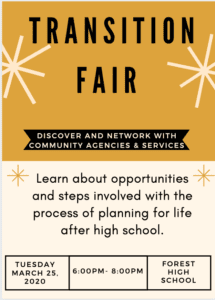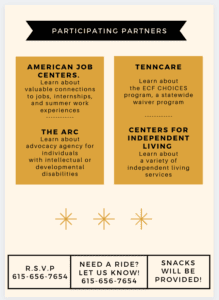Who should attend?
All families of students with disabilities can be invited to the transition fair; their attendance will help them plan for their child’s future. There should be no age limit for students who have families that would like to attend the fairs. Feel free to invite families of students in elementary, middle, and high school. Special attention should be given to reaching parents of students ages 14 – 22 who are receiving transition services through their special education program.
Planning the fair
It is important to connect with many community partners that will share beneficial information for the families. Here are some ideas of things you can do to prepare for the fair:
- Learn about important partners to include. Ask school staff who they would invite. Search online for agencies near you. Ask any current community partners what other organizations should be involved. The more people you ask about possible contacts, the bigger your network can become.
- Send a survey to people that will participate, including families: ask what they would want from the event, along with dates/times that are most convenient to them. Learn about solutions you can provide for families to make sure they can attend if they would like to, such as transportation or childcare needs.
- Encourage participating partners to provide handouts with information summarized, and supply links to additional online resources, for families to take home.
- Provide vendors with guidelines on making handouts and other materials accessible
- Encourage participating partners to include visuals in their materials for accessibility.
- Make a map of where each vendor will be located, so they know where to go when they arrive. Plan it so that attendees will circulate through all of them, like in a path. It could be in a hallway, or an open space like a gym or cafeteria.
- Find out if any of your families will need a translator. Schools might be able to help arrange for an interpreter if needed.
- Many times, student groups need volunteer hours, and would be able to come to the school to watch younger children. Or check with the high school’s student groups—often National Honor Society or TN Promise recipients will have a volunteer requirement. Meet with the group’s sponsor to set up a group of students and have them design activities and crafts for the children.
- Find out if transportation is needed for families to attend. See if you can arrange for teachers or other school staff to pick up parents using school vans or a bus when needed. Make sure to check to see if special transportation is needed for wheelchair users
- If you have some budget, providing some snacks is always a plus. You could also visit local area businesses that sell food, and ask for donations for the meeting.
Sending the invitation…get the word out!
Here are some ideas and considerations to keep in mind when promoting the transition fair:
- Send flyers home to families with students.
- Post flyers around school.
- Post in school or district newsletters that are sent to families.
- Share in a series of social media posts on school’s Facebook or Instagram pages.
- Share information online on the school’s website or the school’s master calendar. Share on the classroom online portal if there is one.
- Ask community partners to share information with families they are working with.
- Use educators that have relationships with families to encourage them to attend and explain why it is beneficial.
- Have flyers translated for families that speak another language.
- Tell students why this fair is important so they can also communicate with parents.
- If possible, tell parents about fair during IEP meetings.
Including students during the planning
- Create the flyer for the event with the students as a class activity.
- Students can volunteer at the fair, handing out snacks or checking in families and partners.
- Provide instruction on the importance of connecting with community partners.
- Role-play with students how to start a conversation with an agency representative at the fair.
- Provide students a punch, stamp, or sticker card to encourage them to talk to as many partners as possible.
Virtual transition fairs
Transition fairs are a great way for families and students to learn about supports provided after high school. However, it can sometimes be difficult for families to attend in person. A virtual transition fair can be hosted via video conferencing applications to supplement an in-person transition fair, and be offered numerous times to reach as many parents as possible. Recording the virtual fair increases accessibility andallows viewers to watch the fair any time. Engage all your community partners to share briefly about their organization and then utilize chat and discussion features to encourage interaction.
After the fair
- Send a thank you card to every agency/service that participated. Make thank you cards with students.
- Send a survey to people that participated for feedback.
- If food is donated, make a note to thank the suppliers.
- Debrief with students about what they learned at the fair.
- Follow up with families, letting them know they can reach out to you with any questions after the fair.
Examples of community partners
- American Job Centers. These local job centers are run by the state labor department. They can provide valuable connections to jobs, internships, and summer work experiences. https://www.tn.gov/workforce/jobs-and-education/job-search1/find-local-american-job-center.html
- Centers for Independent Living. These nonprofit organizations are typically led by self-advocates and provide a variety of independent living services. https://www.ilru.org/projects/cil-net/cil-center-and-association-directory-results/TN
- WorkAbleTN. This program helps students and adults who receive benefits understand how working might impact their SSI or SSDI. https://www.tndisability.org/workabletn
- TennCare. This agency is responsible for administering the ECF CHOICES program, a statewide waiver program that provides health care services to people with intellectual and developmental disabilities. This waiver provides medical, behavioral, and employment resources and supports. https://www.tn.gov/tenncare.html
- Tennessee Department of Mental Health and Substance Abuse Services. For students who have mental health disabilities, the state mental health agency is an important resource to connect them with. https://www.tn.gov/behavioral-health.html
- State department of developmental disabilities. In Tennessee, that’s the Tennessee Department of Intellectual and Developmental Disabilities (or DIDD). This agency provides a variety of programs and supports for adults with intellectual and developmental disabilities. https://www.tn.gov/didd.html
- State social security department. This department is responsible for Supplemental Security Income (SSI) and Social Security Disability Insurance (SSDI) benefits students might receive. https://www.ssa.gov
- The Arc, an advocacy agency for individuals with intellectual or developmental disabilities. There is a statewide Arc Tennessee, along with local county Arc offices. https://www.thearctn.org



